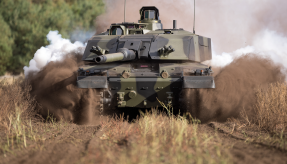
European Cyber Security Month is currently underway with a number of events across the continent designed to promote cyber security and advocate change in the perception of cyber threats by promoting good practice.
The event began in 2012 and has been held every October, increasing in popularity every year, with 2016 seeing 433 events across 31 countries.
As part of the event, Atkins commissioned new research on cyber security, which has been revealed in the Cyber Resilient Infrastructure Report – ‘Defence and security in the information age’.
The report covers a range of articles outlining how the UK might become a more cyber resilient nation, looking at the evolving military risks to CNI in the modern world and includes a contribution from General Sir Richard Barrons, former Commander Joint Forces Command.
Respondents to the report research included senior figures across a wide range of CNI, government and defence organisations. These included Airbus Defence & Space, Anglian Water, Department for Culture, Media & Sport, MBDA Missile Systems, Ministry of Defence Joint Forces Command, Qinetiq, Raytheon UK and the UK Space Agency.
The main concern raised by the research (recorded from some 58% of respondents) was low levels of confidence in supply chain CNI, with half of these expressing no confidence at all. This is a major concern going forward particularly in the defence sector. The aim to bring 25% of purchasing from SMEs brings challenges of its own, and CNI security is a major issue. People reported confidence in their own organisation’s security, but it is considered to be much more difficult to protect information assets and intellectual property once it entered a wider supply chain.
Further to these concerns about supply chain, some 50% of respondents considered people/employees to be their top concern. This response covered a range of issues including insider threat, user browsing, board-level awareness, and staff understanding of the part they play in helping to protect their organisation.
A quarter of those responded expressed concerns over network compromisation and insufficiently protected legacy systems, such as issues around the Internet of Things and Cloud-based services. Finally the growth of organised and state-sponsored cyber-crime was seen as an issue by some 8%.
All these issue reflect the same concerns found in research taken last year, but a greater understanding of the issues and scale of threats has been found.
Looking ahead, respondents cited their top three CNI cyber security concerns for the future as the rapid advance of technology, especially convergence, this was followed by the growth of organised and state-sponsored cyber-crime and lastly a shortage of skills required for the UK’s cyber defence.
Andy Wall, Atkins’ head of cyber security explained: “As well as serving as a confidence barometer, the research results also help paint a picture of the CNI and defence industry’s major cyber security concerns, both today and in the future. Although some of these results are concerning, there are of course some CNI organisations – particularly the civil nuclear industry – who are leading in this area, and there is much that parallel sectors could learn from their example.
“Alongside the concerns outlined above, transparency was also raised as an enduring industry challenge. A lack of clear definitions of risk terms and reliance upon confusing technical language to define the cyber threat is turning off senior leaders. This in turn is preventing them from fully understanding the risks and potential mitigation measures. Hopefully this new report will help to overcome some of those barriers.”
To download a free copy of the report and research, please visit: explore.atkinsglobal.com/cyber
If you would like to join our community and read more articles like this then please click here
Atkins CNI Cyber Cyber Resilient Infrastructure Report cyber security cyber threat Europe European Cyber Security Month skills shortage supply chain








